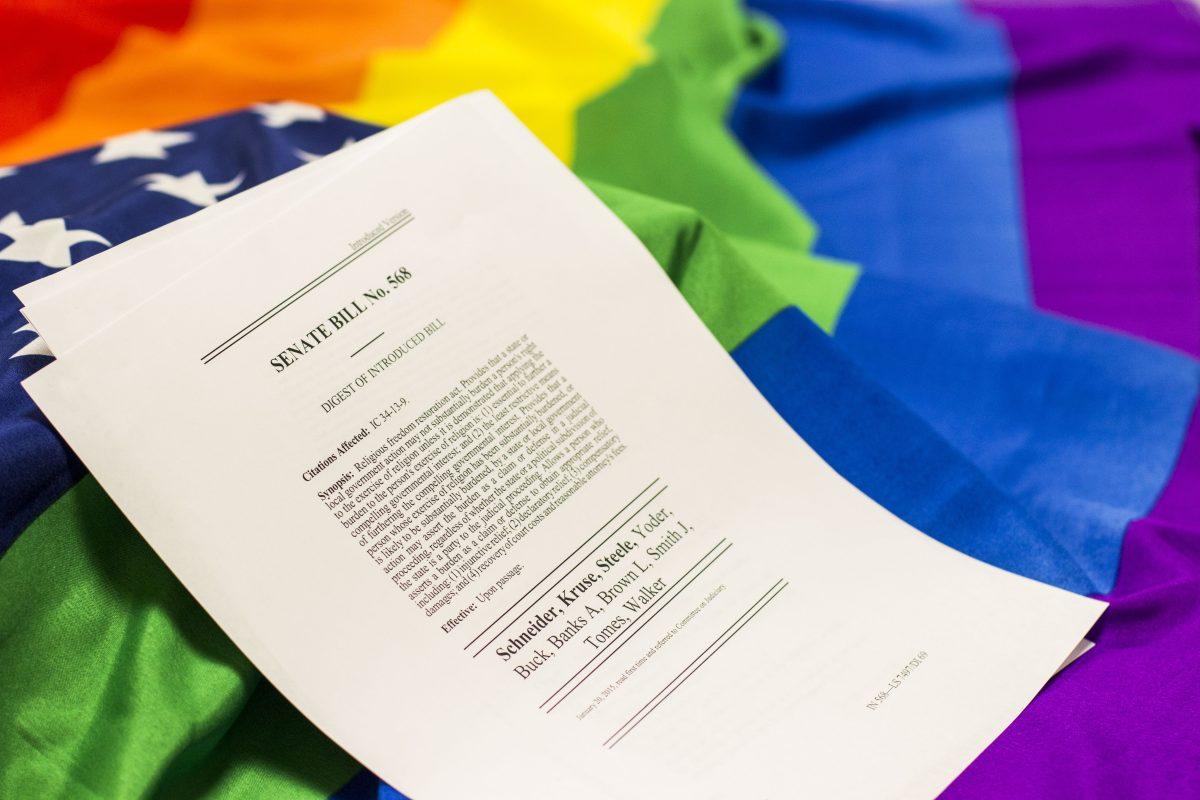The decision by Indiana Gov. Mike Pence to sign the “Religious Freedom Bill” has led to concerns among LGBT advocates.
The law states that the government may not interfere with someone’s right to exercise their religion unless it is proven that doing so is “essential to further a compelling governmental restriction,” and does so in the least restrictive means possible.
According to a news release from the Indiana governor’s office, the law is intended to ensure individuals have right to exercise their religion without government interference, but critics argue the law’s wording invites discrimination by businesses against the LGBT community.
Meg Penrose, a professor at the Texas A&M School of Law, said possible examples include a jeweler who refuses to sell wedding rings to a gay couple, or a wedding photographer who leaves after realizing the marriage is for two women.
Penrose said arguments surrounding the law’s discrimination stem from the broad language, which could extend the religious freedom to private businesses and corporations.
“So this law, from everything I’m able to tell, explicitly allows any for-profit business to assert that that business — not just the owners, but the business — has the right to the free exercise of religion,” Penrose said.
Penrose said it’s too early to tell if the Religious Freedom Restoration Act, RFRA, would actually discriminate against the LGBT community.
“Could it potentially result in legal discrimination? Yes, but I want to see how the law is enforced and how the law comes up in individual situations,” Penrose said. “Certainly the language is broader that all other RFRAs that I’ve read about, but that doesn’t necessarily mean that it will be permitted to be enforced that broadly.”
A similar federal RFRA was passed in 1993 during the Clinton administration, and a 1997 Supreme Court decision led several states to pass similar RFRA laws.
“Around 20 states have religious freedom restoration acts or similarities that mirror or try to resemble what was passed in 1993,” Penrose said. “The reason the states have to pass these laws is the Supreme Court actually issued opinion in 1997 in a case, City of Boerne v. Flores, that told congress they can’t issue a RFRA for the states.”
Texas is one of the states that passed an RFRA in 1999, but Penrose said the Texas law is not as expansive as the Indiana law.
Penrose said the growing number of RFRAs are a reaction to fears that the Supreme Court will constitutionalize same-sex marriage as well as a reaction to local non-discrimination laws currently in place.
“Some states and some cities have non-discrimination clauses that they passed at the most local level of legislation, saying you cannot discriminate in public accommodations against individuals based on sexual orientation, or variety of other classes,” Penrose said. “These religious freedom restoration acts then serve as a defense to that.”
Saad Dawoodi, biochemistry senior and president of Shades of Queer, an LGBT student organization, said this law represents a recent trend toward “right to discriminate” legislation, and that it’s an example of how religion is “weaponized” to combat the legal gains of the LGBT community.
“The right to discriminate legislation has been on the rise recently,” Dawoodi said. “I’m not surprised in the least, and this backlash against the LGBT rights movement and community is obviously because people who are not in favor of the LGBT community or movement are scared that essentially that they’re going to lose their toys.”
Brandon Orr, graduate student and president of the campus Association of Baptist Students, said although gay marriage is against his beliefs, he doesn’t believe that merits a discriminatory attitude toward same-sex couples.
“I definitely don’t think that they should be able to just turn anyone away because of what they’re affiliated with, I think that’s kind of dumb,” Orr said. “The Bible is very specific about gay marriage and it’s wrong, and I believe that it’s wrong, but if someone was gay and they came into my store, there’s no way I would just turn them away.”
Dawoodi said the media coverage, controversy and protest that came as a result of this legislation is representative of the power of the people.
“I think it sends a message to corporations that have gotten a lot of power over the past decades,” Dawoodi said. “I think it’s a good reminder for companies and America as a whole that the community can mobilize.”
Right to discriminate?: Indiana bill tests religious limits, concerns LGBT advocates
March 30, 2015
0
Donate to The Battalion
$2790
$5000
Contributed
Our Goal
Your donation will support the student journalists of Texas A&M University - College Station. Your contribution will allow us to purchase equipment and cover our annual website hosting costs, in addition to paying freelance staffers for their work, travel costs for coverage and more!
More to Discover










